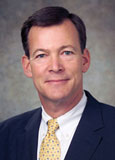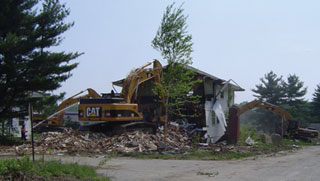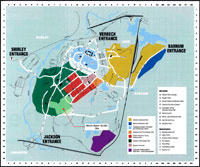NORTH AMERICAN REPORTS
|
Barracks to Biologics
orld War II barracks are coming down and modern biologics lab and manufacturing space is going up on the site that formerly was Fort Devens in Massachusetts. The early June announcement of a $660- million initial investment in a facility at the site by Bristol-Myers Squibb is just the latest chapter in a post-BRAC success story. Its theme? Make your property redevelopment strategy move as fast as the 10th Special Forces once did. "Focused and fast" is how Bob Culver, CEO of property owner MassDevelopment, characterizes the deal, which unfolded over an eight-month time frame and included finalist sites in Sanford, N.C., Clay, N.Y.
"We never got a nod of the hat until the last day," says Culver. "Right up to the final moment, we knew we had to prove ourselves. From our perspective, the winning solution was expedited permitting, an amount of open space free of any encumbrances, the willingness of abutting cities and towns to deal with issues such as height [variance], and the ability to provide water and power in quantities necessary to make a $600-million biopharma deal work in Massachusetts." In this case, the expedited permitting meant 75 days instead of the already-swift 90 days that Devens already had in place. Also central to the deal was a 13-acre (5.3- hectare) bit of land that Culver and his team call "the thumb," which still belonged to the U.S. Army and was formerly used as a motor pool area. "The Department of Defense cooperated in incredibly fast form and a swap was put into place," says Culver. The swap was helped along by U.S. Representative Martin Meehan and Senator Edward M. Kennedy. Asked if the scope of this project makes this one of the bigger deals he's worked on, Jim Harbaugh, senior director, corporate real estate for Bristol- Myers Squibb, says, "Absolutely. In my business, if you get to site a couple plants like this in a career, you feel pretty good about it." Harbaugh came to work for BMS in 1991, the same year that the closure of Fort Devens was announced. That closure was carried out in 1996. Since that time, 80 companies, 4,200 employees and have come to Devens. Don't Fly Away "We considered a number of options, including building a new facility and purchasing an existing facility, and we explored these options concurrently originally," he says. Working with New Jersey- based consulting firm Stadtmauer Bailkin Biggins, Harbaugh's team performed desktop analysis according to established criteria like work force skill level, then went to market with a blind RFP in October 2005, sent to seven domestic and international jurisdictions. "Responses from those were reviewed, and the real short list was established," says Harbaugh. Asked if the American Jobs Creation Act of 2004, which allows U.S. companies to repatriate foreign profits virtually tax- free, was at least a partial motivator for looking to locate this facility in the U.S., Harbaugh says, "In addition to the criteria we used for site suitability and overall economics, we considered a U.S. location as an opportunity to increase domestic profitability, and to utilize cumulative assets we had, so the U.S. made a lot of sense for us." It also made a lot of sense to locate near what Harbaugh calls the "thriving biotech cluster" in and around Boston, 35 miles (km.) to the southeast. Average salary at the new complex will be $60,000. "The manufacturing process of biologic compounds is extremely complex, so a highly skilled work force was necessary," he says, citing both the existing knowledge base in Boston and a state educational system that "supports and even enhances talents required for this facility." Stem cell research is not currently related to the BMS biologics business, but Harbaugh says BMS advocates the continued use of stem cell and related research because it is a critical component of scientific research. "It was not part of this decision, but is something we support," he says. Massachusetts is one of a handful of states that has proactively exhibited its support for stem cell research, recently welcoming a large project in that field from Harvard University. Harbaugh says the current building plans call for a modular design that features six 20,000- liter bioreactors. "Envision them as large stainless steel vats, shipped on a 'super- skid,' and put into place with a good deal of the mechanical piping already connected," he says. "The modular concept means future expansion is possible and also made more simple." This will be the company's first large scale cell culture facility, and its first use of this particular construction method. Construction is expected to begin by September 2006, and the facility is projected to be operationally complete in 2009, with commercial production of biologic compounds anticipated to begin in 2011. Once operational, the site will require an initial workforce of approximately 350 employees. The facility will be modular in design in order to accommodate future expansion, which would lead to a total of approximately 550 employees at the site. "The new Devens manufacturing facility would support increased production capacity for commercially available biologic compounds, such as Orencia (abatacept), and biologic compounds currently in development," announced the company, "including the company's investigational treatments for solid organ transplant rejection and certain types of cancers." Orencia is the company's first biotech drug. Still Working
For his part, Harbaugh says the finalist sites were all composed of "real professionals, and each worked beyond diligently to attract this project. We were lucky that each had a viable location for this facility." But a comprehensive review of multiple factors brought Massachusetts' site to the top. Harbaugh says this is the first project that he's been involved with on a redeveloped military base, and that the presence of former military personnel on the MassDevelopment team was a great resource. While many BRAC sites pose significant environmental problems, he says, "Our site does not have any major environmental issues of any sort. They were handled prior to our involvement with it, so we feel very comfortable with that situation on this site." The company will also be comfortable with its reception from the trio of adjoining towns: Ayer, Harvard and Shirley. All have recently backed measures to incorporate Devens as a separate town, measures that will come before voters in town meetings and on November ballots. Harbaugh says if anything, that incorporation will likely have positive implications for Bristol- Myers Squibb. The incorporation is just the latest stage in well- planned community support for the redevelopment. The initial phase was smartly launched well before closure, in 1993, and involved legislation that established Devens as a 4,400- acre (1,781- hectare) planned community governed by the 12-member Devens Enterprise Commission. Even with recent setbacks like Procter & Gamble's elimination of 100 jobs at its distribution complex there, Devens has proved to be a reliable attractor of corporate facility investment, and certainly a good return on the $17 million the state agency paid DoD for it in 1996. Now its biggest facility is on the horizon, and it may get bigger: Some reports tout a potential expansion scenario that would lift the company's cumulative investment total to more than $1 billion. |


 Jim Harbaugh, senior director, corporate real estate, for Bristol- Myers Squibb, says the nearby biotech cluster in the Boston metro favored Devens, where in mid-June World War II-era barracks were coming down to make way for a modern biologics complex.
Jim Harbaugh, senior director, corporate real estate, for Bristol- Myers Squibb, says the nearby biotech cluster in the Boston metro favored Devens, where in mid-June World War II-era barracks were coming down to make way for a modern biologics complex.
